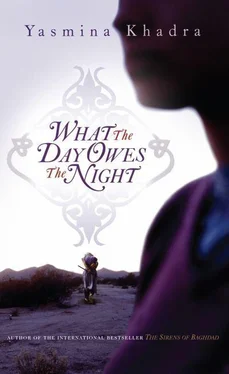‘A love poem! So, are you going to tell us who’s making your heart beat faster?’
Fabrice snapped his notebook closed and looked André up and down.
‘I guess I’m ruining your inspiration,’ grumbled André.
‘You’re winding him up is what you’re doing,’ Simon barked. ‘Just go away and leave us alone.’
André pushed his Stetson back off his head and put his hands on his hips.
‘What the hell is up with you? Why are you so pissed off at me?’
‘Can’t you see he’s in the middle of writing a poem?’
‘It’s just hot air . . . Pretty words are not the way to a girl’s heart, take my word for it. All I have to do is click my fingers and I can have any girl I want.’
Disgusted by André’s crassness, Fabrice picked up his notebook and stormed out of the diner. Stunned, André watched him leave, then turned back to us. ‘What did I say? Has he lost his sense of humour or what?’
We were all slightly shocked by Fabrice’s sudden departure. Ordinarily, he was the most considerate and polite of us and the least likely to take offence.
‘Must be the side effects of being in love,’ Simon said bitterly, realising that what he had seen between Fabrice and his fantasy girl with the mysterious eyes was not just an idle chat.
That night we went over to Jean-Christophe’s house. He had something he wanted to talk to us about; he wanted our advice. He ushered us into his father’s small study on the ground floor. He watched us sip fruit juice and eat crisps for a minute, then announced:
‘It’s all over . . . I’ve finally broken up with Isabelle.’
The rest of us expected Simon to be overjoyed at this news, but he said nothing.
‘Do you think I made a mistake?’
Fabrice rested his chin in his hands and thought.
‘What happened?’ I found myself asking, though I had long sworn never to get involved in their affairs.
Jean-Christophe, who had been waiting for an excuse to tell all, gave a weary shrug and said: ‘Isabelle’s too complicated. She’s always finding fault, always correcting me about stupid things, always reminding me that my family is poor and she’s doing me a favour just by being with me . . . I’ve threatened to break up with her lots of times, and every time she says: “Go ahead!” This morning was the last straw. She nearly lynched me right in the street in front of everyone just because I looked at that girl we saw the other night at the party.’
A tremor ran around the room. The table seemed to shake. I saw Fabrice’s Adam’s apple bob and Simon’s knuckles go white.
‘What?’ asked Jean-Christophe, astonished at the sudden silence. Simon glanced at Fabrice, who cleared his throat and stared at Jean-Christophe.
‘Did Isabelle catch you with that girl?’
‘No . . . I haven’t even seen her since the party. I was just walking Isabelle to the dressmaker’s and the girl was coming out of Benhamou’s shop.’
Fabrice looked relieved; he relaxed a little and said:
‘You know, Chris, none of us can tell you what you should do. We’re your friends, but we don’t really know what goes on between you and Isabelle. You’re always saying you’re going to dump her, then the next day we’ll see the two of you walking hand in hand, so it’s hard to believe you’re really serious. In any case, it’s your business. You need to decide what you want to do. You and Isabelle have been together ever since you were at school. You know better than we do where you stand.’
‘But that’s my point – we’ve been together since we were at school, and I still don’t know where I stand. I don’t know if I’m happy. It’s like Isabelle owns my soul. Even though she can be difficult and she orders me around, sometimes I can’t imagine my life without her. I swear that’s the truth. There are times when all her faults just make me love her more . . .’
‘Forget her!’ said Simon, his eyes blazing. ‘I always said she wasn’t right for you. You can’t go through life with her like some chronic illness. A handsome guy like you, you shouldn’t give up on life. Besides, all this fighting and making up is getting boring.’ As he said this, he got to his feet – just as Fabrice had done at the diner that morning – and stormed out.
‘Did I say something stupid?’ Jean-Christophe asked, astonished.
‘He hasn’t really been himself lately,’ Fabrice said.
‘What’s the matter with him?’ Jean-Christophe turned to me. ‘You know him better than anyone; what’s going on in his head?’
I shrugged. ‘I don’t know.’
Simon had got it bad, and his frustration was beginning to get the better of his natural good humour. All the insecurities he had spent a lifetime hiding from were finally coming to the surface. His clowning around and his self-deprecating jokes had been a way of hiding his faults – being fat, being short, being awkward with women. The sudden appearance of this dark-haired girl was forcing him to face up to the unspoken truths that were ruining his life.
Simon and I ran into each other by accident a week later. He was on his way to the post office and was happy for me to tag along.
His rage since the flare-up with Jean-Christophe had not abated. He looked as though he hated the whole world.
We walked though the village in silence, like shadowgraphs on a wall. Having collected his forms from the post office, Simon seemed lost. He did not know what to do. We met Fabrice as we were coming out of the post office. He wasn’t alone. She was with him, and she had her arm through his. All we had to do was look at them – Fabrice in his tweed suit and her in a flowing pleated dress – and we knew. In an instant, all the bitterness drained from Simon’s face. How could he not accept this when they looked so perfect together?
Fabrice quickly introduced us.
‘This is Simon and Jonas, I told you about them, they’re my best friends.’
Framed by the sun, the girl was even more beautiful now – she was not flesh and blood but a blaze of sunlight.
‘Simon, Jonas, this is Émilie, Madame Cazenave’s daughter.’
It was as if someone had thrown a bucket of cold water over me. Simon and I simply nodded and smiled – speechless, though for very different reasons. By the time we had regained our composure, they had left. We stood on the steps of the post office for a long time, unable to utter a word. How could we resent them? How could we question such loving completeness without appearing brutish?
Simon owed it to himself to concede defeat, and this, with considerable flair, he did.
SPRING WAS gaining ground. The dew on the hills shimmered in the dawn light like a sea so inviting you wanted to strip off, dive in and swim until, exhausted, you found a shady tree where you could lie and dream, one by one, of the things the good Lord had made. Every intoxicating morning was a miracle, every stolen moment a fragment of eternity. In the sunshine, Río Salado was a marvel. Everything the sunlight touched turned to dream; nowhere in the world had my soul ever found such peace. News of the outside world filtered through as garbled rumours that did nothing to disturb the pleasant rustle of the vines. We knew Algeria was at war, that a seething anger festered among the people, but the villagers in Río Salado seemed to care little about this. They built high walls around their happiness; walls with no windows on the outside world. They were content to gaze at their handsome reflections in the mirror, then head off into the vineyards to harvest the sunshine.
Río Salado was unperturbed. The burgeoning harvest promised good wines, a dazzling whirl of dances and fruitful marriages; the ominous thunderclouds gathering elsewhere could not be allowed to darken a sky of such pure, perfect blue.
Читать дальше












